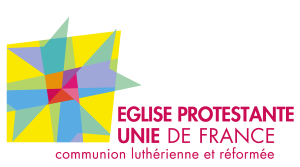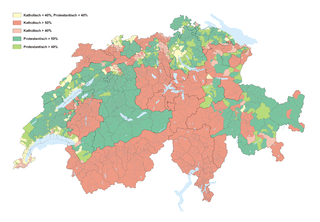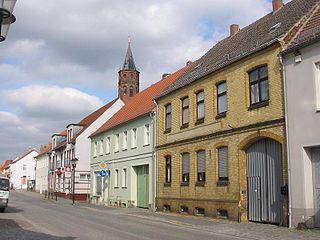
Anabaptism is a Christian movement which traces its origins to the Radical Reformation. The movement is generally seen as an offshoot of Protestantism, although this view has been challenged by some Anabaptists.
The Protestant Church in the Netherlands is the largest Protestant denomination in the Netherlands, being both Reformed (Calvinist) and Lutheran.

The Reformation was a movement within Western Christianity in 16th-century Europe that posed a religious and political challenge to the Roman Catholic church – and papal authority in particular. Although the Reformation is usually considered to have started with the publication of the Ninety-five Theses by Martin Luther in 1517, there was no schism between the Catholics and the nascent Lutheran branch until the 1521 Edict of Worms. The edict condemned Luther and officially banned citizens of the Holy Roman Empire from defending or propagating his ideas. The end of the Reformation era is disputed: it could be considered to end with the enactment of the confessions of faith which began the Age of Orthodoxy. Other suggested ending years relate to the Counter-Reformation, the Peace of Westphalia, or that it never ended since there are still Protestants today.

Huguenots are an ethnoreligious group of French Protestants.

The Evangelical Church in Germany is a federation of twenty Lutheran, Reformed (Calvinist) and United Protestant regional churches and denominations in Germany, which collectively encompasses the vast majority of Protestants in that country. In 2017, the EKD had a membership of 21,536,000 members, or 26.1% of the German population. It constitutes one of the largest national Protestant bodies in the world. Church offices managing the federation are located in Hannover-Herrenhausen, Lower Saxony. Many of its members consider themselves Lutherans.
This article presents lists of the literary events and publications in 1508.

The Counter-Reformation, also called the Catholic Reformation or the Catholic Revival, was the period of Catholic resurgence that was initiated in response to the Protestant Reformation. It began with the Council of Trent (1545–1563) and largely ended with the 1781 Patent of Toleration, although smaller expulsions of Protestants continued into the 19th century. Initiated to preserve the power, influence and material wealth enjoyed by the Catholic Church and to present a theological and material challenge to Reformation, the Counter-Reformation was a comprehensive effort composed of apologetic and polemical documents, ecclesiastical reconfiguration as decreed by the Council of Trent, a series of wars, political maneuvering including the efforts of Imperial Diets of the Holy Roman Empire, exiling of Protestant populations, confiscation of Protestant children for Catholic institutionalized upbringing, heresy trials and the Inquisition, anti-corruption efforts, spiritual movements, and the founding of new religious orders.
The Dutch Reformed Church was the largest Christian denomination in the Netherlands from the onset of the Protestant Reformation until 1930. It was the foremost Protestant denomination, and—since 1892—one of the two major Reformed denominations along with the Reformed Churches in the Netherlands.

Hermann of Wied was the Archbishop-Elector of Cologne from 1515 to 1546.

Bentheim-Steinfurt was a historical county located in northwestern North Rhine-Westphalia in the region surrounding Steinfurt, Germany. Bentheim-Steinfurt was a partition of Bentheim-Bentheim, itself a partition of the County of Bentheim. Bentheim-Steinfurt was partitioned: between itself and Bentheim-Tecklenburg-Rheda in 1606; and between itself and Bentheim-Bentheim in 1643.

Protestant Reformers were those theologians whose careers, works and actions brought about the Protestant Reformation of the 16th century.
Protestantism originated from the Protestation at Speyer in 1529, where the nobility protested against enforcement of the Edict of Worms which subjected advocates of Lutheranism to forfeiture of all of their property. However, the theological underpinnings go back much further, as Protestant theologians of the time cited both Church Fathers and the Apostles to justify their choices and formulations. The earliest origin of Protestantism is controversial; with some Protestants today claiming origin back to groups in the early church deemed heretical such as the Montanists.
Mathieu-Nicolas Poillevillain de Clémanges was a French humanist and theologian.

The World Communion of Reformed Churches (WCRC) is the largest association of Reformed churches in the world. It has 233 member denominations in 110 countries, together claiming 100 million people, thus being the third largest Christian communion in the world after the Roman Catholic Church and the Eastern Orthodox Church. This ecumenical Christian body was formed in June 2010 by the union of the World Alliance of Reformed Churches (WARC) and the Reformed Ecumenical Council (REC).

Protestantism is the second largest form of Christianity with collectively between 800 million and more than 900 million adherents worldwide or nearly 40% of all Christians. It originated with the 16th century Reformation, a movement against what its followers perceived to be errors in the Roman Catholic Church. Protestants reject the Roman Catholic doctrine of papal supremacy and sacraments, but disagree among themselves regarding the real presence of Christ in the Eucharist. They emphasize the priesthood of all believers, justification by faith alone rather than by good works, and the highest authority of the Bible alone in faith and morals. The "five solae" summarise basic theological differences in opposition to the Roman Catholic Church.
The Protestant reformation in Sweden is generally regarded as having begun in 1527 during the reign of King Gustav I of Sweden, but the process was slow and not definitely ended until the Uppsala Synod of 1593 and the following War against Sigismund, with an attempt of counter-reformation during the reign of John III (1568–1592).

Ucides cordatus, the swamp ghost crab, is one of two species of crabs in the genus Ucides. This species of crab is native to many coasts off of the western Atlantic Ocean. It has been found to be native to areas as far as Florida, to as southern as Uruguay. U. cordatus is especially noteworthy in the country in Brazil as it plays important roles in the economy and food resources at Brazil’s Atlantic borders.

The United Protestant Church of France is the main and largest Protestant church in France, created in 2013 through the unification of the Reformed Church of France and the Evangelical Lutheran Church of France.

The Swiss Reformed Church is the Reformed branch of Protestantism in Switzerland started in Zürich by Huldrych Zwingli (1484–1531) and spread within a few years to Basel, Bern, St. Gallen, to cities in southern Germany and via Alsace to France.











